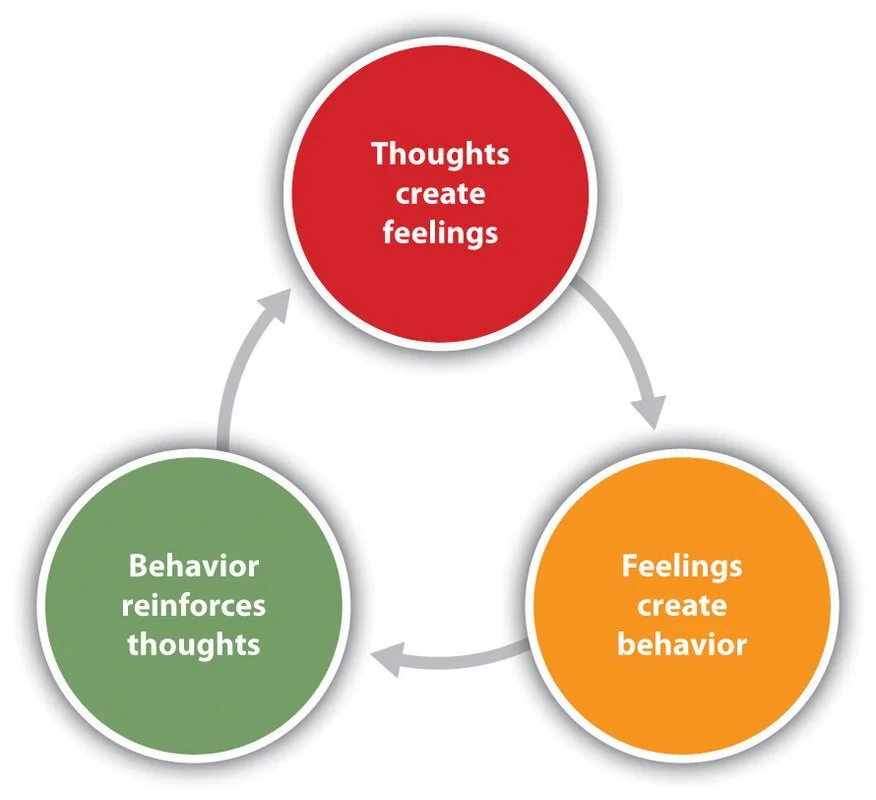
Looking for a straight-forward way to cope with stress, anxiety and depression?
CBT Therapy
CBT Therapy - the short version
Cognitive Behavioural Therapy (CBT) is a structured, goal-oriented form of therapy that focuses on identifying and changing negative thought patterns and behaviours. It helps individuals manage issues like anxiety, depression, PTSD, and phobias by teaching practical skills for coping with overwhelming emotions and stress.
Unlike traditional talk therapy, CBT Therapy is action-focused, encouraging clients to challenge distorted thoughts, engage in positive behaviours, and gradually confront fears through techniques like exposure therapy. This therapy is often used alongside other treatments for a more holistic approach, focusing on observable changes and providing tools for lasting mental well-being.
CBT is especially effective for those struggling with anxiety, depression, and social withdrawal, offering solutions for overcoming negative thinking and behavioral patterns. Key strategies include cognitive restructuring, behavioral activation (engaging in enjoyable activities), and behavioural experiments to test beliefs.
Clients also learn to track their thoughts and emotions outside of sessions, reinforcing the skills learned. Although CBT Therapy doesn’t address underlying trauma, it provides a powerful framework for improving immediate coping skills and can be a valuable part of a broader therapy plan.
If that sounds intriguing and you’d like to speak with a CBT therapist about if CBT Therapy is right for you, fill out the contact form or book a free virtual consultation. No pressure, just a supportive conversation about your needs and if this is the right step for you to take.
Have you been told by your doctor to try CBT Therapy?
Are you looking to fill your toolbox with coping strategies for anxiety and depression?
Does the idea of traditional talk therapy not suit you?
CBT might be the right option for you. Put simply, CBT is more about solutions and building skills for addressing problems as they arise.
What is CBT Therapy?
CBT therapy, or Cognitive Behavioural Therapy is a type of therapy that focuses on helping identify and change negative thought patterns and behaviours. CBT can help manage stress, anxiety, and other overwhelming emotions, and is based on the idea that our thoughts, feelings, and behaviours are interconnected.
An important idea in CBT, is that by changing one of these aspects, you can affect changing in the others.
Who Can Benefit From CBT Therapy?
Those struggling with anxiety and overwhelming worry about the future. A CBT counsellor can support them in developing a more balanced perspective and releasing their tendency towards black-and-white thinking.
Those struggling with depression, and overwhelming pessimistic thoughts about the past. In fact, CBT is all about coping mechanisms for observable behaviours and challenges for when you want to focus on the here and now. If you struggle with digging into root causes (like trauma or attachment) or talking about the past, CBT Therapy is a great tool for change.
Those struggling with phobias. A central strategy of treatment for phobias is systematic and gradual exposure to the feared stimulus. In CBT, an individual struggling with a phobia will address the associated feelings and thoughts before beginning exposure therapy. It will be a slow process geared toward their needs and comfort level.
Those struggling with PTSD and OCD.
Note: CBT is a great tool for behavioural or thinking changes, but because it doesn’t address the root cause of these issues, they’re likely to resurface in other ways until the person takes a closer look at the whole picture.
CBT is an effective piece of the therapy puzzle. It is most often done alongside other therapies to build a unique treatment plan for each individual client and their personal goals.
Ultimately, CBT is a wonderful add-on to other therapies. It can help with observable steps towards change. Once our clients are more stable regarding their primary issues, other therapies may be brought in to address the person holistically and offer them tools for meaningful and long-lasting change.
Core Principles of CBT Therapy
The core principles of CBT revolve around the idea that our thoughts, feelings, and behaviours are interconnected and influence each other.
Cognitive restructuring involves identifying and challenging negative or distorted thoughts and beliefs that contribute to emotional distress. Clients learn to replace these self-destructive thoughts with more realistic and balanced ones.
Behavioural activation. CBT emphasizes the role of behaviour in influencing mood. Specifically, a client will learn to identify and change behaviours that contribute to their problems, like avoiding social situations or activities that they enjoy.
Exposure therapy is a technique used to treat anxiety disorders, such as phobias and PTSD, where clients are gradually exposed to the source of their fear in a safe and controlled environment to help them overcome their anxiety.
Main Elements of CBT Therapy
Identifying and Changing Negative Thought Patterns
One of the key elements of CBT is learning to recognize those pesky negative thoughts that like to sneak into our minds.
Your therapist will teach you how to spot these automatic negative thoughts and show you techniques like cognitive restructuring to help you challenge and modify them.
CBT always has homework assignments to track and challenge these negative thought patterns outside of your therapy sessions. You need to be ready to dedicate outside time so you can:
Track your thoughts
Rate your feelings
Observe and record behaviours
If you can’t do that because of either time or energy reasons, then CBT therapy isn’t the right therapy for you.
Challenging Cognitive Distortions
Cognitive distortions are those little tricks our minds play on us, making things seem worse than they really are. The good news? CBT therapy can help!
Your therapist will educate you about common cognitive distortions like black-and-white thinking or catastrophizing and will help you practice reframing these thoughts using evidence-based reasoning.
If you ever get stuck, your therapist may use a technique called Socratic questioning, which helps you challenge those irrational beliefs head-on through a series of questions.
Encouraging Positive Behaviours Through Behavioural Activation
Behavioural activation (BA) is a core component of CBT therapy that focuses on helping clients do activities that are meaningful and enjoyable to them! Ultimately, this helps improve their mood and overall well-being.
BA is based on the idea that when people are depressed or anxious, they often withdraw from activities that they used to love, which can further exacerbate their symptoms.
BA techniques in CBT therapy can be minimal or intense and can include things like activity monitoring, scheduling, behavioural experiments, social skills training, and problem-solving training.
Techniques and Strategies in CBT Therapy
Let's dive into some of the most common techniques and strategies used in Cognitive Behavioural Therapy (CBT).
Psychoeducation
Psychoeducation helps clients understand how their thoughts, feelings, and behaviours are connected and how they affect their mental health. It teaches clients about their condition, treatment options, coping skills, and promotes self-confidence while reducing stigma. This education can be provided in various formats, like discussions, written materials, or videos, and is tailored to each client’s needs.
Behavioural Experiments
Clients and therapists work together to test the accuracy of a client's beliefs through real-life experiences. For example, a client with social anxiety who believes others are constantly judging them might engage in a social activity, like joining a conversation at a party, and then observe how others actually react. By reviewing the results with the therapist, the client can challenge their negative beliefs, leading to a better understanding of their anxiety and a potential reduction in fear. This hands-on approach is a key part of CBT.
Thought Records
Thought records are a useful tool in CBT that help clients track their thoughts, emotions, and behaviours. With the therapist's guidance, clients use these structured forms to identify and challenge cognitive distortions, or unhelpful thinking patterns. By regularly reviewing thought records, clients can spot patterns and track their progress towards better mental health, much like keeping a journal.
Exposure Therapy
Exposure therapy helps you gradually face your fears in a safe, controlled way with the support of your therapist. They will guide you through feared situations, teach you coping techniques for managing anxiety, and adjust the exercises based on your progress. This approach allows you to confront your fears in a healthy, supported environment, unlike facing them on your own.
CBT Therapy vs. DBT
Let’s take a closer look at CBT therapy vs DBT (Dialectical Behavior Therapy).
CBT focuses on identifying and modifying dysfunctional thoughts and behaviours. It’s meant to help you break free from negative thinking patterns and behaviours that hold you back.
DBT leans more towards emphasizing acceptance and change, particularly for individuals with borderline personality disorder.
While both therapies share some techniques, like mindfulness and emotion regulation, they differ in their overall treatment goals and emphasis on acceptance. So, depending on your needs and preferences, one therapy might be a better fit for you than the other.
Explore Ontario CBT Therapy at Access Therapy
Access Therapy offers a range of CBT-based interventions tailored specifically to your individual needs. If one of these teachings or strategies sticks out to you, then our team of licensed therapists would be happy to help you explore how CBT therapy can help.
Contact us today to schedule your free therapy consultation and begin your journey toward improved mental well-being.
Your brighter future starts now. 🙌
CBT Therapy In Hamilton
Contact us today to schedule your free therapy consultation and begin your journey toward improved mental well-being.





